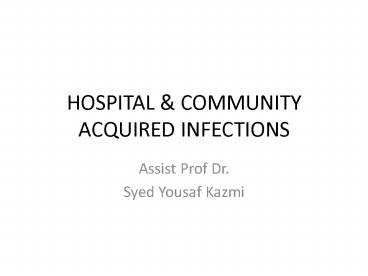HOSPITAL - PowerPoint PPT Presentation
1 / 23
Title:
HOSPITAL
Description:
HOSPITAL & COMMUNITY ACQUIRED INFECTIONS Assist Prof Dr. Syed Yousaf Kazmi OBJECTIVES Define Community & Hospital Acquired infections Discuss the pathogenesis of ... – PowerPoint PPT presentation
Number of Views:394
Avg rating:3.0/5.0
Title: HOSPITAL
1
HOSPITAL COMMUNITY ACQUIRED INFECTIONS
- Assist Prof Dr.
- Syed Yousaf Kazmi
2
OBJECTIVES
- Define Community Hospital Acquired infections
- Discuss the pathogenesis of community hospital
acquired infections - Discuss the etiology epidemiology of community
hospital acquired infections
3
COMMUNITY ACQUIRED INFECTIONS
- An infection contracted outside of a health care
setting or an infection present on admission - http//medical-dictionary.thefreedictionary.com/c
ommunity-acquiredinfection - An infection acquired in the community
- http//www.medterms.com/script/main/art.asp?articl
ekey38208
4
HOSPITAL ACQUIRED INFECTION (NOSOCOMIAL INFECTION)
- A hospital-acquired infection is usually one
that first appears three days after a patient is
admitted to a hospital or other health care
facility - http//medical-dictionary.thefreedictionary.com/Ho
spital-AcquiredInfections - An infection acquired in a hospital by a patient
who was admitted for a reason other than that
infection - WHO
5
HOSPITAL ACQUIRED INFECTION (NOSOCOMIAL INFECTION)
- An infection occurring in a patient in a
hospital or other health care facility in whom
the infection was not present or incubating at
the time of admission - WHO Definition
6
COMMUNITY ACQUIRED INFECTIONS
- For infection to occur, susceptible host,
pathogen and mode of transmission all must act
together - Yellow fever prevalent in Africa America but
not in Asia(Pathogen Not present) - In Europe/ Scandinavian countries-No case of
Diphtheria (No susceptible host)
7
COMMUNITY ACQUIRED INFECTIONS
- All infections that we acquire in community
- RTI (Sinusitis, Pharyngitis, Pneumonia etc.)
- GIT Infection(Ac GE, Dysentery, etc.)
- UTI (Cystitis, pyelonephritis etc.)
- CNS infections (Meningitis, Brain abscess)
- Skin soft tissue infection (Boil, Impetigo,
Cellulitis, Herpes simplex)
Herpes labialis
Boil due to Staph aureus
8
COMMUNITY ACQUIRED INFECTIONS
- Causative organisms of Community Acquired
Infections are different from Hosp Acq Inf - Most infections are viral esp. Respiratory Tract
Infections - Bacterial pathogens are usually susceptible to
multiple conventional antimicrobials - Highly resistant organisms e.g. MRSA, VRE, MDR TB
are acquired from community in low frequency
Lobar pneumonia
9
COMMUNITY ACQUIRED INFECTIONS
- RESPIRATORY TRACT INFECTIONS
- Upper RTI-mostly viral (Adenovirus, Rhinovirus,
Coronavirus etc.) - Lower RTI-mostly bacterial (Strep pneumoniae,
Haemophilus influenzae, Mycoplasma pneumoniae,
Legionella pneumophila etc.) - Acquired from other patients through droplet
infection - Strep pneumoniae-from oropharynx
10
COMMUNITY ACQUIRED INFECTIONS
- GIT INFECTIONS
- Bacterial (Shigella, Campylobacter, Vibrio
cholerae etc.), Parasitic (E
histolytica, Giardia, etc.) - Feco-oral route in community setting e.g. school,
campus, etc. - UTI
- Mainly female
- Usually pregnant
- Bacteria (E coli 75, Klebsiella, Proteus spp.)
11
- VIDEO
12
MCQ
- A 32-years-young pregnant lady in her second
trimester complained of burning frequency of
micturition with haematuria. Her urine RE reveal
multiple pus cells. The culture of the urine will
most likely isolate which of the following
pathogen? - Proteus mirabilis
- Pseudomonas aeruginosa
- Serratia marcescens
- Escherichia coli
- Staphylococcus aureus
- Correct answer d
13
HOSPITAL ACQUIRED INFECTIONS
- Infections acquired while in the hospital
- Excludes all disease that patient is incubating
during admission (e.g. Chicken pox incubation
period is 10-21 days) - Hospital acquired infections are different from
community acq inf
14
HOSPITAL ACQUIRED INFECTIONS
- The host is usually immunocompromised of varying
degree - Pathogens encountered in the hospital settings
are different - Mean of transmission in hospital setting are also
different from community setting
Common Hospital acquired infections
15
HOSPITAL ACQUIRED INFECTIONS
- COMPROMISED HOST
- Some form of physical injury
- Burn, trauma etc.-bacteria can enter body
- Low immunity-body own flora cause disease e.g.
Candida infection of GIT
16
HOSPITAL ACQUIRED INFECTIONS
- HOSPITAL PATHOGENS
- Pathogens from other patients, healthcare staff,
environment etc - Opportunistic pathogens of own flora
- Pathogens are multiple antimicrobial resistant
- MRSA, VRE, MDR pathogens common
Microorganism of total infection
Coagulase neg staphylococci 15.3
Staphylococcus aureus 14.4
Enterococcus spp. 12.1
Candida spp. 10.7
Escherichia coli 9.6
Pseudomonas aeruginosa 7.9
Klebsiella pneumoniae 5.8
Enterobacter spp. 4.8
Acinetobacter baumannii 2.7
Klebsiella oxytoca 1.1
Top 10 infectious agents in Hospital acquired
infections Source CDC 2008
17
HOSPITAL ACQUIRED INFECTIONS
- CHAIN OF TRANSMISSION
- Direct contact b/w patients, visitors, healthcare
staff - Indirect contact-through dust, environment,
equipment etc. - Indwelling equipment most imp source-urinary or
I/V catheters, ventilators, N/G tube, etc.
18
HOSPITAL ACQUIRED INFECTION
- VIDEO
19
HOSPITAL ACQUIRED INFECTION
- HOSPITAL ACQUIRED UTI
- Mostly catheter related
- Enterococcus sp., Pseudomonas aeruginosa., E
coli, Staphylococcus sp., Candida spp . - Multi-drug resistant
20
HOSPITAL ACQUIRED INFECTION
- HOSPITAL ACQUIRED RTI
- Micro-aspiration of upper airway secretions
- Ventilator associated, ET intubation associated
- Pseudomonas aeruginosa, E coli, Klebsiella
spp., Acinetobacter baumannii, Haemophilus
infleunzae, etc. - Usually multidrug resistant isolates
21
HOSPITAL ACQUIRED INFECTIONS
- SURGICAL SITE INFECTIONS
- Infection of surgical incision
- Mostly by Staph aureus, Enterococcus, Pseudomonas
aeruginosa, E coli, Anaerobes etc. - Pathogens transmitted by healthcare staff hands,
dirty equipment, etc
22
HOSPITAL ACQUIRED INFECTIONS
- Prolonged Hospital stay
- Increased morbidity
- Mortality
- Many infections are preventable
- Economic burden due to antimicrobial
administration hospital stay - Acquisition of drug resistance spread of
virulent pathogens
23
THANK YOU































